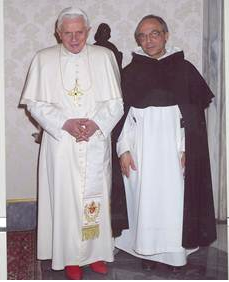Greetings All:
The conclave is big news not only for Catholics but much of the world is fascinated with the whole affair. I’ve been approached by curious Protestants, agnostics and atheists alike with questions and opinions about the Popes abdication and its significance.
Some have strong opinions, others just want to know what we Catholics are thinking about the whole thing. Invariably, the conversations lead to discussions about Church history, governance, theology of the Papacy, inerrancy and infallibility, the power of the Holy Spirit, free will and sin.
This is a fantastic time for evangelization. We don’t even need to bring up the topic of the Church. It is the news de jour.
Case in point. Craig is a friend who has been a regular guest at our home for several years. He is a non-churched, non-practicing Methodist but still has strong faith and prays regularly. His pithy, cogent spiritual insights regularly remind me that God works wherever we are and with whomever he chooses.
I was a little bemused that Craig was so bothered that the Pope had resigned. He felt that the Pope was abandoning his post prematurely and that he had a duty to work until he died – just like all the other Popes in his lifetime. He had been deeply moved by the heroic witness of John Paul the Great during his final months. During our talk, I realized that the Pope is not just a rock for Catholics but the Pontiff is a sign of holiness and stability to the whole world.
As recounted above, the conversation led to discussions ranging from the Magisterium and infallibility to Church history and theology and especially the power of the Holy Spirit to bring good out of bad. (We know that in all things God works for the good of those who love him. Rom 8:28)
Finally, I suggested to Craig that he needn’t take my word for any of it and invited him to come to Mass and see for himself. I was very pleasantly surprised when he responded, “Sure, why not?”
Even the sex scandals present opportunities to discuss sin, depravity and redemption. Some of you know Herb N. a Southern Baptist attorney who visited with us many times, attended Mass and studied the Catechism – all after intense discussions about the scandal of pederast priests. I still recall how disappointed he was in the Church. He took it personally, as if the affront was to his own Church. (Which it was, of course)
Herb has yet to convert – it is very difficult to give up a lifelong faith tradition, one in which you and your family and friends were raised and nurtured, baptized, married and buried. But Herb is now an apologist for the Catholic Church and he may yet swim the Tiber.
What I’ve learned and am learning is that personal evangelization depends as much on listening as it does talking – maybe more so. Don’t be afraid of challenging topics – they are actually opportunities for dialog. And finally, don’t push and never argue. Consciously love the person and be sure to acknowledge the value and earnestness of their prayer life and their love for God. It is very important that we respect their views and opinions. We don’t need to agree with them but we do need to respect them. It helps me to remember that if they are baptized they are already members of the Church and loved by Jesus.
Pax
Steve Graves



